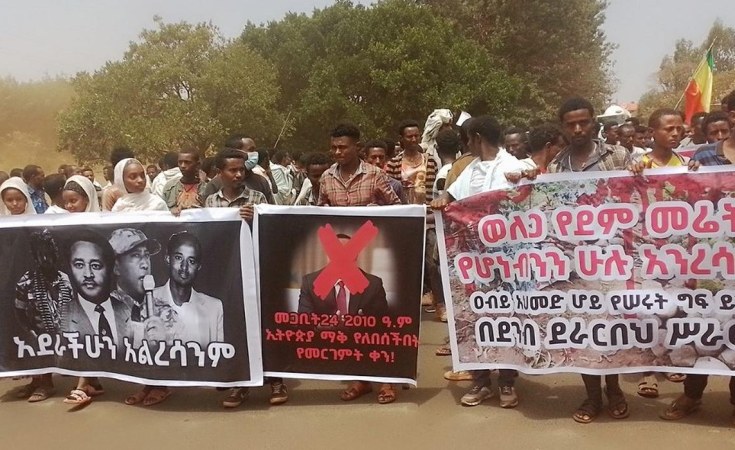Addis Ababa, Ethiopia — Residents in northern Ethiopia's Amhara region say local fighters briefly took over a police station and seized weapons amid ongoing clashes between protesters and the military.
The fighting was sparked last week when Ethiopia's government ordered all regional forces to integrate with federal forces or regional police. Amhara residents say gunfights have erupted in cities and authorities have shut off the internet.
In the Amhara region town of Mezzezo, residents said they heard heavy gunfire early Wednesday as armed Amhara fighters, known as FANO, took over a police station.
One resident who did not want to be identified due to security concerns, told VOA the fighters were after a delivery of weapons.
He said at around 4 a.m., there was heavy gunfire at the police station and bullets were raining down on their roofs.
"When we asked the police what happened," he said, "They told us 'They (armed fighters) hit us.'"
After "a lot" of gunshots, the fighters packed up weapons and left around 5:30 a.m., he said.
Protesters attack army camp
Protests and clashes erupted in Ethiopia's Amhara region last week after the government ordered regional forces such as FANO to integrate into the federal military or police.
While the numbers of those injured in the region's clashes could not be immediately confirmed, Reuters news agency quoted the mayor of Kombolcha as saying several people were shot there on Tuesday.
Mayor Mohammed Amin told Reuters that protesters attacked an army camp after false rumors spread that federal troops had taken Amhara regional fighters into custody.
Witnesses reported casualties in the city of Debre Birhan, 130 kilometers northeast of Addis Ababa, though numbers could not be confirmed.
One resident, who would give only his first name, Esayas, told VOA there have been ongoing clashes since Tuesday.
"Protesters are refusing to let security forces enter while defense forces are saying they will control the town.," said Esayas. "FANO and the residents of the town have taken up whatever (weapons) they can, such as sticks or machetes, and they are waiting. "
Residents told VOA that authorities have taken their usual response of shutting down internet access in cities such as Gondar and Amhara's regional capital, Bahir Dar.
An explosion at a bar in Bahir Dar on Monday killed two people and wounded several others.
Insecurity growing
Aid group Catholic Relief Services said two of its staff were shot and killed on Sunday in Amhara as they were returning to Addis Ababa.
While it was not immediately clear if the deaths were related to the unrest, they have underscored concerns about worsening insecurity in the region.
Yonas Adaye is the former director of the Institute for Peace and Security Studies at Addis Ababa University. He said the integration of regional forces is needed for a lasting peace.
"Nine or eleven special armies, that is really not amicable for Ethiopia's economy, social development, and sustainable security," he said.
Ethiopia's federal government has not confirmed casualty figures from the clashes and unrest in Amhara.
Last week, Prime Minister Abiy Ahmed said regional forces would not be disarmed but vowed their integration would be carried out by force if necessary.
Ethiopia is emerging from a devastating two-year war in the north of the country, after the federal government and Tigrayan forces signed a peace deal in November.
Amhara forces fought alongside the Ethiopian and Eritrean armies against the Tigrayan rebels in the war, which left hundreds of thousands of people dead and displaced millions.


